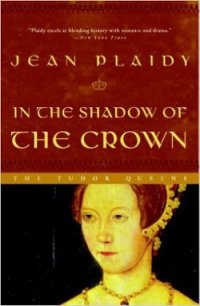The Sun in Splendour - Plaidy Jean (электронную книгу бесплатно без регистрации .txt) 📗
So he felt better for a while after a sojourn with her.
But later of course the haunting returned.
The weeks were passing. People did not talk quite so often of
the death of the Duke of Clarence and ask themselves whether he had fallen into the butt of malmsey or had been pushed into it.
In time even events like that were forgotten.
Edward ceased to think of his brother every morning when he awoke. It was only occasionally now when he would suffer that sudden catch of his breath as he realized he had condemned his own brother to death. Clarence deserved it, he kept assuring himself. He had to die. It was Clarence or disaster. The country was not safe while Clarence lived.
There was one other matter which disturbed him. He had imprisoned Robert Stillington in the Tower and tried to forget him. But that was not possible of course. He had to do something about the man.
It was now three months since he had been imprisoned.
Edward made up his mind that he could not allow him to remain there indefinitely. Questions would be asked. It was not as though Stillington was an insignificant person.
It was on a bright June day when Edward rode to the Tower and slipping in without ceremony ordered that he should be conducted to the room in which Bishop Stillington was held.
When he arrived, the Bishop hastily rose and hope shone in his eyes as he bowed low.
Robert Stillington was an ambitious man; he had chosen the Church as his profession not only because it suited his nature but because he saw means of advancing himself through it. He had shown himself to be an able man and preferment had come to him. He was now the Bishop of Bath and Wells. For a time he had been Lord Chancellor being a strong Yorkist but on the return of the Lancastrians in 1470 he had been deprived of his office. Edward had reinstated him but he had resigned from the office a few years later. Yet he and Edward had worked together on occasions. Edward had felt uneasy about the Tudors for they had made themselves prominent in the Lancastrian cause and he particularly suspected Jasper of subversive planning from Brittany. Jasper was getting old but he had with him his nephew Henry Tudor and by the way in which he kept that boy, nurtured him and trained him, suggested that he might have plans for him.
Edward had considered Henry Tudor. Unfortunately his mother was Margaret Beaufort descended from John of Gaunt and of course the Tudors said they had royal blood because of that connection with Henry the Fifth's Queen. It was a myster-
ious relationship. Some were sure there had been a marriage, others said there had not. But in any case it was a very flimsy claim. Still, there was a strength about the Tudors, and Edward had decided that he would be more at peace if jasper and his nephew Henry were in his care. He had sent Stillington to bargain with the Duke of Brittany to bring them out of that country and to England but as old Jasper discovered what was afoot and escaped with his precious nephew that had come to nothing. It was however no fault of Srillington.
Now the two faced each other and Edward studied the Bishop intently.
'So, my lord Bishop,' he said, 'you have spent the spring in this place.'
'It is so, my lord.'
'It was well deserved,' said Edward.
The Bishop bowed his head and said nothing.
'You spoke ill chosen words where it was most unwise to do so.'
'That was so, my lord.'
'My brother is now dead.'
An almost imperceptible shiver crossed Stillington's face. By God, thought Edward, he believes I have come to murder him.
'I am a lenient man. Bishop,' he said quickly. 'Do you agree with that?'
'My lord, none could have been more so to the Duke.'
'So because I act kindly towards men, because I understand their foibles and sometimes forgive, there are those who think it is amusing to provoke me since it will bring no punishment.'
'I never thought that, my lord.'
'Andyet. . .andyet. . . .'
Edward's eyes had started to blaze. He was rarely angry but when he was he could be fierce. Shllington knew this and trembled.
He went down on his knees. 'My lord,' he said, 'I ask your forgiveness. I swear nothing shall pass my lips again.'
The King was thoughtful. He looked down at the Bishop's head and was thinking of that occasion ... so long ago now it seemed. He could see them all in the little room—Eleanor, seeming so desirable then. Worth all the trouble. Virtuous, beautiful . . . the sort of woman a man had to make sacrifices for. And he had not been a king then. The Bishop had warned him, this very
Bishop. Pompous old fool, he had thought. What did Bishops know of love?
And so there had been that ceremony . . . that fateful ceremony which if it were brought to light could wreak what damage? His marriage to Elizabeth no marriage at all! His son . . . little Edward a bastard and that would apply to all his children. Oh no, it must be stopped at all costs. At all costs. Clarence had paid with his life. The secret would never have been safe with Clarence. Once Clarence knew, once he had spoken of it, that had to be the end of him.
And now the Bishop. . . . But the Bishop was not Clarence. The Bishop was a man of good sense. He had babbled. He had made a fatal error. He knew it now. He had learned the bitter lesson for three long months.
He would not commit such an error again.
'Get up,' said Edward.
The Bishop rose and Edward looked at him steadily.
'You have been foolish. Bishop,' he said. 'Do you agree with me?'
'Indeed I do, my lord.'
'You and I were good friends once.'
'My lord, I trust we still are.'
'When you seek to harm me?'
'My lord, what I did was done through carelessness ... I whispered ... I talked ... I could cut my tongue out now.'
'And if you had the chance over again you would be silent. . . . You would not talk of this matter?'
'My lord, I swear it.'
There was a silence which seemed to the Bishop to go on for a long time.
Then the King said: 'I believe you, Stillington. You acted foolishly and carelessly and without any thought of what this could mean. You will not do such a thing again?'
'My lord, I promise.'
'Then I am going to be kind to you, Stillington. You shall pay a fine and go free.' Edward moved very close to the Bishop and seizing him by the shoulder looked down on him from his great height.
'It would go so ill with you, my friend, if you ever did, that I know you will not. That is why I am going to send you away a free man—on payment of your fine, which indeed you owe, I trust.
Bishop, that you will be of as good service to me as you were before this unfortunate incident occurred. Remember, that with a less lenient master, it could have cost you your life.'
'My lord, you are good and great and like all truly great men you are merciful.'
That is so. Now I will take my leave of you. Bishop. You may prepare to leave. I will give the order.'
With that Edward left him.
He came out into the fresh air; he was smiling. He had settled that matter. There would be nothing more from Stillington. He could put that tiresome matter out of his head for there was an end to it.
Now if only he could banish George from his thoughts he could be a happy man.
DEATH AT WESTMINSTER
These were the good days. Edward could congratulate himself. When he had come to the throne the country had been in a state of disorder. He had brought it to prosperity. He was strong; while at the same hme he was amazingly affable. His extraordinary good looks could not fail to distinguish him. Of late they had deteriorated from the golden glory of their youth. He had grown fat but his great height helped to disguise it and in some ways his immense bulk made him even more impressive than ever. He had the respect of his subjects and no matter what fines he levied he held their affection.




